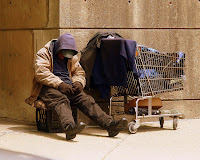SE + NE + $$$ + STG + TR = STC.
E#PT X NSR = STB.
STB TO STC = ODDS OF SUCCESS
There it is, the
Prozac Monologues Down And Dirty Algorithm, to weigh your costs and benefits for medication or any other treatment for any mental illness, or any other medical condition, for that matter. Click on the first and second lines. They will take you to the posts that develop the formula.
Can you believe we finally made it?
We started with the:
Manifesto of a Lab Rat.
I am a Lab Rat. Yes, I am.
The Manifesto begins there.
It continues:
 If I am a lab rat, I will be a free-range lab rat.
What I mean by free-range lab rat is this:
I insist that I contribute more to this enterprise than my body.
If I am a lab rat, I will be a free-range lab rat.
What I mean by free-range lab rat is this:
I insist that I contribute more to this enterprise than my body.
Your doctor tells you to
weigh your costs and benefits, but gives you no way to do so, other than
insufficient information + gut + desperation = noncompliance, if you don't come up with the same answer as your doctor.
What we need is an algorithm: logical rules that we can apply to objective data to solve a problem.

This algorithm does not exist.
So as an interested party, a very interested party, given that my body is the test tube, I decided that my contribution to this chemistry experiment would be the algorithm.
The problem we want to solve is this:
Do I Want To Put These Chemicals Inside My Body?
This task has continued over several posts this fall, interspersed with a few sick leaves and vacation days. Click on
costs and benefits to follow the whole development. (The first post is at the bottom, dated August 19, 2010).
What To Do With The Algorithm
The resulting algorithm can be applied not only to the chemicals you put in your body, but any other form of treatment as well, talk therapy, aerobic exercise, yoga, Chinese medicine, acupuncture, even aroma therapy, should you choose.
You can compare the results of the cost/benefit analysis of different treatments, and do the same with various combinations, when you can find the numbers. Which admittedly, you cannot for any of these that do not get Blue Cross Blue Shield reimbursement.
There
are numbers out there for talk therapy and aerobic exercise. But doctors do not usually use the word
therapy for anything other than chemicals or electro-convulsive therapy (ECT) or any of those new-fangled electrical interventions. That is the context in which you are told to weigh your costs and benefits.
For the most part, I have used antidepressants as examples. One out of every ten people in the United States is taking them right now. So this would be the most common application, among psychotropic medications.
It was helpful to look at chemicals as I developed this algorithm, because they are the form of treatment with the greatest costs and greatest variety of costs:
dizziness and confusion,

insomnia and fatigue,
weight gain, irritability, sexual dysfunction, irritability.
So this is what you do when you use the algorithm to weigh your costs and benefits -- you compare two numbers,
STC (Short Term Costs) and
STB (Short Term Benefits).
And how do we get those numbers?
Remember,
SE + NE + $$$ + STG + TR = STC.
E#PT X NSR = STB.
The abbreviations increase the confusion quotient, and thus make it look scientific.
Here is a translation:
Side Effects (
SE) plus Not Effective (
NE) plus Money (
$$$) plus Stigma (
STG) plus [lack of] Trust (
TR) are your costs (
STC). These costs are based on the reasons people give for discontinuing their medication.
Efficacy Given The Number of Present Trial (
E#PT) times How Many Would Not Experience Spontaneous Remission Unless They Took the Medication
(
NSR) are your benefits (
STB).
Did you like my illustrated tour of the previous posts?
And Where Are We Supposed To Get Our Data?
They ought to be provided to you by your doctor, who has told you to weigh your costs and benefits. Except for money, stigma and trust -- you have to come up with your own odds that you will quit taking your medication because you can't afford it, you are afraid for your reputation, or you do not trust your doctor.
They ought to be provided to your doctor by the drug reps.
But they are not.
So you have to do your own research.

I think the algorithm would make a fabulous app. The numbers could be regularly updated, from the latest research by scientists not funded by the companies that sell these chemicals.
I claim copyright, by the way.
Long Term Costs And Benefits Are Missing
Notice that I refer to
short term costs and benefits. Some will object that I left out good reasons to
take meds: the difference that meds make to how quickly another episode occurs (relapse rate), how long various approaches take to work (time to remission), how medications affect things like brain mass, suicide risk.
Others will object that I left out good reasons
not to take them: the possibility that medication might accelerate the natural progression of the disease, the possibility that the diagnosis is off and you will flip into mania or hypomania, liver damage, the consequences of weight gain, such as heart disease and diabetes, suicide risk.
Someday I will do a post or two on that suicide risk issue. There is a lot to say about that.
Well, this algorithm is complicated enough and took five posts already. This one has that i-Pod potential. The one that includes all those other issues will take more gigabytes.
STC versus STB give you the odds.
Once more I repeat, they do not give you your decision. There are additional personal factors that influence or even override logical rules, objective data, and problem solving.
Personal Factors:
You have used up your sick leave, your vacation time and your family leave for this year and next, and your boss will fire you if you don't start taking meds.
Your wife has issued a similar ultimatum.
You can't get out of the loony bin any other way.
You are desperate.
You have the knife to the wrist.
Like I said, it is your decision. I am merely your humble servant. Who
does occasionally buy a Powerball ticket.
How Does The Algorithm Work?
Let me give you a personal example.
When I first took Prozac, Eli Lilly's website said that it had helped
70% of the 55,000,000 who had already taken it. I didn't know anything about spontaneous remission or the effect of which trial this was. So
STB = 70.
Meanwhile, none of the side effects
(SE) reported went above the
15% range; the odds that it would not be effective
(NE) were
30 out of 100; it was already generic, and I could afford it
($$$); stigma
(STG) was not an issue for me; and I had total trust
(TR) in my doctor. So
STC was 15 + 30 + 0 + 0 + 0 = 45.
That meant (with the information I had) that
the odds for Prozac were 70 to 45 in favor. And I could put off therapy. No brainer.
Next up -- actually, five
keep trying's later, we had moved on to a psychiatrist who prescribed Effexor.
Crazy Meds says:
for deep, despairing clinical depression that needs to respond to the standard tweaking of the three most popular neurotransmitters, Effexor XR (venlafaxine hydrochloride) often pulls people out of the abyss. By then, the deep, despairing abyss -- that would be me.
My doc said I get good results from Effexor. She didn't say how good results translated to a number,. (That's case studies, by the way -- not research.) But she did tell me to weigh my costs and benefits. By then I knew that most antidepressants have about the same effectiveness level, which I took to be around 40%. I didn't know it mattered that I was on my sixth go round. Odds for benefit, STB = 40%
She also gave me the usual side effects, because I asked. Since insomnia was a major issue for me, and we had run through a number of sleep aids, she said that the insomnia risk (SE) was 15%. Not effective odds (NE) would come in at 60 out of 100. Since she didn't ever answer phone calls, and I knew I couldn't stop this med without help tapering off, and I was wary of her by now, I grilled her on how to discontinue without her help. Trust, lack thereof, (TR) was in the 40% range. STC was 15 + 60 + 40 = 115.
With Effexor, my odds were 115 to 40 against. Not so good this time. However, desperation overcame gut instinct. So I kept trying.
The rules of the algorithm work, but the results are only as good as the objective data. What if I knew then what I know now? Without going into the whole story, and by tweaking numbers actually available:
Prozac --
STB = 40 (E#PT) X .8 (NSR) = 32.
STC = 30 (SE) + 60 (NE) + 0 ($$$) + 0 (STG) + 20 (TR) = 110.
110 to 32 against. I still had issues with therapy (nothing to do with any therapist I have ever known, by the way). And being over-educated, I am on the compliant side. So I would have given it a shot.
Effexor --
STB = 10 (E#PT) X .8 = 8.
STC = 34 (SE) + 92 (NE) + 0 ($$$) + 0 (STG) + 95 (TR) = 221.
221 to 8 against.
The numbers for Effexor come from the STAR*D study, and were available at the time I started taking it. But I didn't know that. STAR*D's original conclusion was that after two antidepressants have been tried, subsequent results are dismal, and more research for better medications should be a priority.
Since then, a jillion articles have been written about how STAR*D was a lousy research design that cooked the books in way favor of the chemicals at every step, starting with the selection of subjects. Click here for my posts that reference STAR*D. But Google it for for what the scientists say.
Anyway, 221 to 8 against -- I would have given it a pass. Even I could tell the books were cooked. And I got so much better after I went off it.
And So The Manifesto Of A Lab Rat Concludes
Of course, your results may vary. Just remember, it's your test tube.
flair from Facebook
i-Pod family photo by Matthieu Riegler, licensed under
the Creative Commons Attribution 3.0 Unported license.png
photo of prozac by Tom Vasco and is licensed under
photo of effexor by Parhamr who has placed it in the public domain
photo of John LeCompte of Evanescence by Samuel Lang,
permission to copy and modify granted under GNU Free Documentation License























































